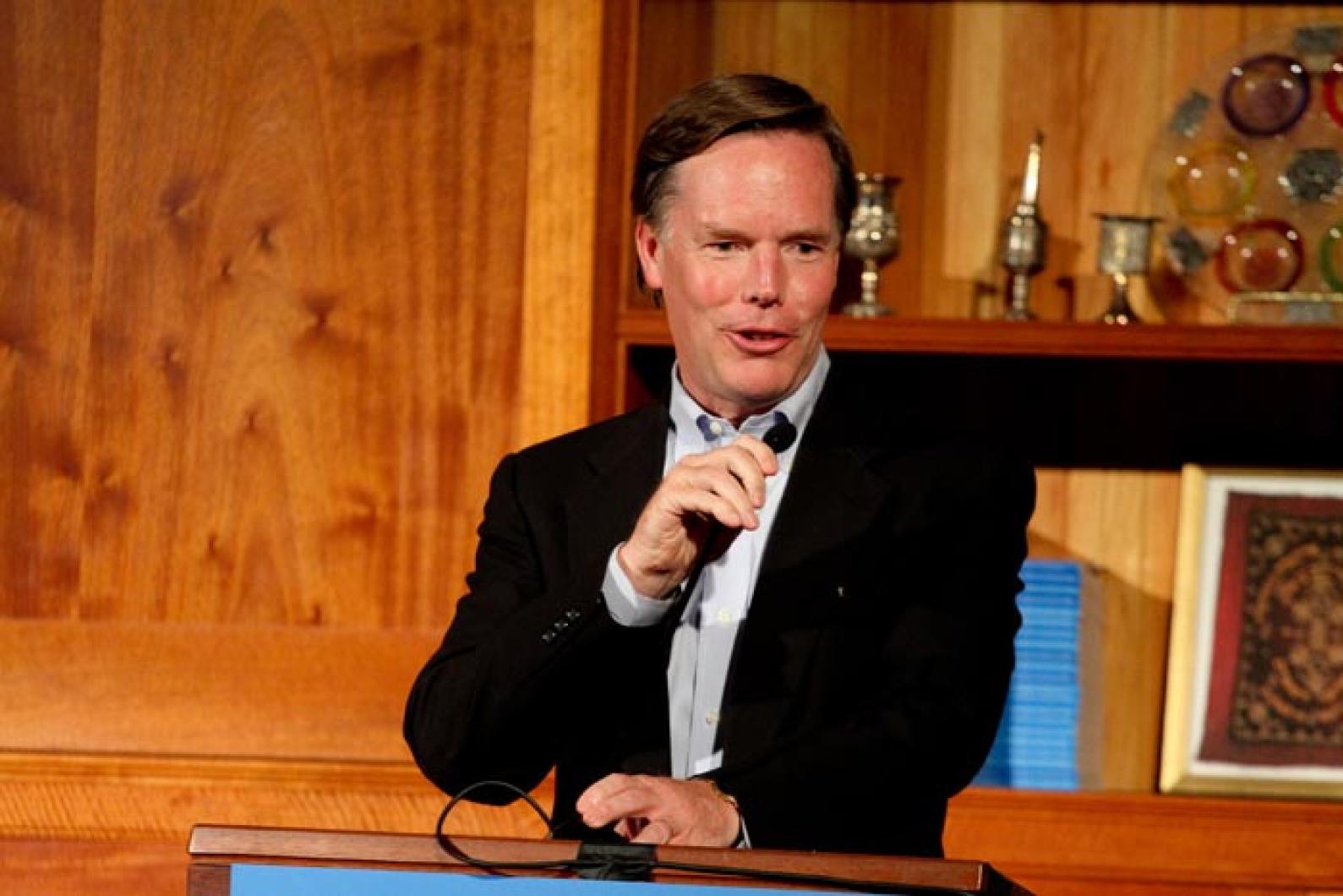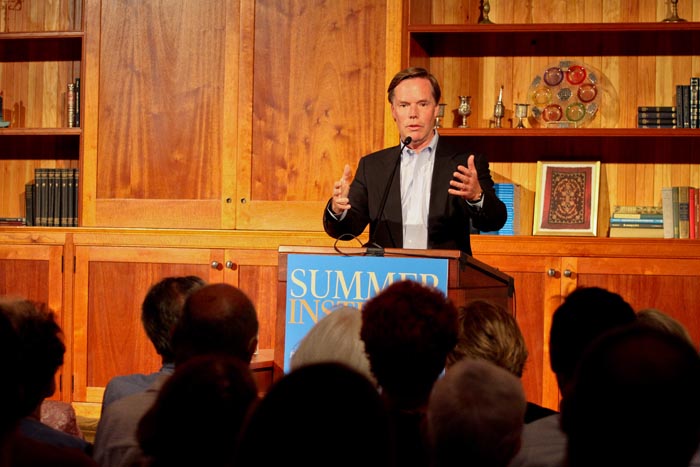Look at Britain around the turn of the 20th century, or Napoleonic France in the early 1800s, or Spain in the late 1500s. Or so many other great powers of their times, before they went into decline.
Now look at the United States of America, in the early part of the 21st century. When R. Nicholas Burns does, he sees a worrying pattern.
“They were brought down, most of them, by the fact that they couldn’t afford it any more,” the veteran diplomat told a capacity crowd at the Martha’s Vineyard Hebrew Center on Thursday.
“They were broke . . . the military foundations of their country seemed strong but there was nothing to back it up.”
Likewise America. It had by far the world’s greatest military, it had values to which others aspired, it had soft power. But the most important pillar of international influence was economic power.
“If we can’t figure out our economic problems we can longer be the dominant military power,” said Ambassador Burns, who served three Presidents and now teaches diplomacy and politics at Harvard’s Kennedy School.
The first of this year’s Summer Institute speakers was slated to talk about the recent revolutions in the Middle East and the challenge they presented for U.S. foreign policy. And he did, but he also roamed far more widely, touching on domestic political issues as well as foreign issues as far away as east Asia. And very little of what he said was comforting.
If resolving America’s economic crisis was the only issue for President Obama, Mr. Burns said, that would be plenty to occupy the first term of any President.
But it wasn’t. Uniquely in American history, Mr. Obama had inherited two land wars in Iraq and Afghanistan, one the product of a neo-conservative, go-it-alone attitude which had alienated traditional allies.
Then there was the other “half-war” in Libya, which America was “fighting with one arm tied behind our back” because “we can’t quite make up our mind about whether we want to overthrow Gaddafi or let him survive.”
There was the problem of Iran’s pursuit of nuclear weapons and Korea’s determination to retain them. Failure to solve those two problems could be catastrophic, he said.
There were the many problems associated with globalization: climate change, international trafficking of people, international crime and drug cartels which now operate in all our cities, the threat of pandemics, the threat of terrorists acquiring chemical, biological or nuclear weapons.
“I think it’s the most complicated and dangerous time I can remember to be in government,” Mr. Burns said.
Above all, he said, would be “the great game of the 21st century,” finding a way to keep the peace with the new powers of Asia without being dominated by them.
“For that happens when countries are unable to right themselves after economic disasters,” Mr. Burns said.
He said unrest in Arab nations would continue to play out for many years to come, with potential costs to both America and Israel. “We may be at the end of act one of a five-act play, which may take five to 10 years,” he said.
The action so far: two dictators down, in Egypt and Tunisia, three countries still in the throes of unrest or civil war, Syria, Libya and Yemen, and two Arab kingdoms trying to get ahead of revolution through hasty reforms, Morocco and Jordan.
Finally, there were the wealthy states of the Gulf region, who appeared to be “surfing through,” the ambassador said, because their people enjoyed high incomes, and the majority of their population was made up of guest workers from other countries.
“But that’s an illusion,” he said. “Beneath the surface, Saudi women want to drive. Sometimes these small acts send ripples out and we see human change take place. I think we may be seeing that in Saudi Arabia.”
Mr. Burns conceded the American response to the various uprisings in the Arab world had been inconsistent, because the balance between conflicting U.S. interests was slightly different in each case. Thus the President had urged Hosni Mubarek to go from Egypt, but had not leaned on the leaders of Syria or the oil-rich Gulf states.
“Here’s the problem for American foreign policy in the Middle East . . . These two sets of interests are directly contradictory to each other,” he said.
On the one hand was American support for Israel, the concern to contain Iran and to defeat terrorism, the urge for stability which had for decades been bought by supporting dictators. On the other hand were the values of freedom, democratic and open society.
As a result President Obama was balanced “on the high wire, with no net,” Mr. Burns said.
As to how the final act might play out, his only certainty was that Egypt was the key player. It is geographically central, the most populous nation and the most culturally important.
As of now, he said, “Israel is the biggest loser of Arab awakening,” and that made it all the more important that America remain engaged as the only possible mediator between Israel and the Arabs.
“But now on extreme left and extreme right, the left wing of the Democratic Party and the Tea Party, we find people who appear to me to be arguing for isolationism. It is suicide in our highly integrated, globalized 21st century,” he warned.
Mr. Burns noted there were more members of marching bands in the world’s greatest military than there are diplomats in the State Department.
In the longer term, Mr. Burns said, that would prove disastrous for a country which could no longer afford to dominate the world through war.
“Ninety per cent of international politics is not fighting, it’s arguing,” he said. “It’s diplomacy, it’s negotiation . . . We don’t have enough people to do that. We’ve rewarded the military and starved the State Department.”





Comments
Comment policy »